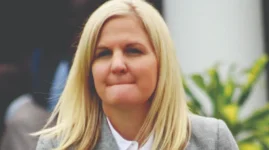Kirsty Coventry, the only female candidate running for International Olympic Committee president, has emphasized keeping the Olympic Movement politically neutral ahead of the March 20 election. The Zimbabwean former swimmer believes athletes from conflict-affected regions deserve protection and support to participate in the Games. As a two-time Olympic champion with seven total medals, Coventry brings her athletic background to the leadership race.
Her career path makes her uniquely qualified for the position. She first competed as an athlete, winning multiple medals. She later transitioned into sports administration, handling organizational matters. Currently, she serves on the IOC Executive Board and acts as Zimbabwe's Minister of Sport, Recreation, Arts, and Culture. These varied experiences help her understand the challenges facing everyone involved in Olympic sports.
If elected as the first female IOC president, Coventry plans to prioritize improved governance throughout the organization. She wants to examine all policies thoroughly to ensure they stay relevant, transparent, and connected to Olympic values. She believes clearer responsibilities should exist for IOC members with better accountability systems. Her involvement in planning future events like the Dakar 2026 Youth Olympics and Brisbane 2032 has shaped her ideas about sustainability.
The historic gender balance achieved at Paris 2024 represents progress, but Coventry says more changes must occur. Equal representation needs to extend beyond athletes to reach National Olympic Committees and international federations. She advocates for leadership equality at every level throughout Olympic structures. Her vision includes continuing this transformation across all aspects of Olympic governance.
Saudi Arabia will host the first Olympic Esports Games during 2027, which Coventry sees as essential modernization. Young audiences engage with sports differently than previous generations did. The Olympic movement must adapt by reaching people through digital platforms and embracing emerging competition styles. Coventry recognizes esports as a major opportunity for connecting with new audiences.
The gaming community fascinates Coventry as a potential partner. Hundreds of millions of young people participate in esports globally. She believes the Olympic movement can share its values with this massive audience. She also thinks gamers can teach Olympic leaders valuable lessons, creating a mutually beneficial relationship between these communities.
According to Coventry, artificial intelligence will transform many aspects of Olympic operations. She expects AI applications ranging from Games management to fan experiences. These technologies might reduce costs significantly, allowing more resources for supporting athletes and Olympic organizations. Her approach balances innovation against preserving fundamental Olympic principles.
Drawing from her successful transition from competition to leadership roles, Coventry understands the practical challenges facing Olympic sports. She wants stronger partnerships between the Olympics, media companies, and corporate sponsors. When fans engage with Olympic content, she believes they should connect with sponsors simultaneously. Her collaborative approach focuses on meeting everyone's needs through partnership.
As election day approaches, Coventry continues discussing future directions with IOC members. She compares her presidential campaign preparation to training for major swimming competitions. This includes maintaining focus, hearing different perspectives, and adjusting strategies based on feedback received. Her athletic mindset influences how she approaches this important leadership opportunity.
Her career path makes her uniquely qualified for the position. She first competed as an athlete, winning multiple medals. She later transitioned into sports administration, handling organizational matters. Currently, she serves on the IOC Executive Board and acts as Zimbabwe's Minister of Sport, Recreation, Arts, and Culture. These varied experiences help her understand the challenges facing everyone involved in Olympic sports.
If elected as the first female IOC president, Coventry plans to prioritize improved governance throughout the organization. She wants to examine all policies thoroughly to ensure they stay relevant, transparent, and connected to Olympic values. She believes clearer responsibilities should exist for IOC members with better accountability systems. Her involvement in planning future events like the Dakar 2026 Youth Olympics and Brisbane 2032 has shaped her ideas about sustainability.
The historic gender balance achieved at Paris 2024 represents progress, but Coventry says more changes must occur. Equal representation needs to extend beyond athletes to reach National Olympic Committees and international federations. She advocates for leadership equality at every level throughout Olympic structures. Her vision includes continuing this transformation across all aspects of Olympic governance.
Saudi Arabia will host the first Olympic Esports Games during 2027, which Coventry sees as essential modernization. Young audiences engage with sports differently than previous generations did. The Olympic movement must adapt by reaching people through digital platforms and embracing emerging competition styles. Coventry recognizes esports as a major opportunity for connecting with new audiences.
The gaming community fascinates Coventry as a potential partner. Hundreds of millions of young people participate in esports globally. She believes the Olympic movement can share its values with this massive audience. She also thinks gamers can teach Olympic leaders valuable lessons, creating a mutually beneficial relationship between these communities.
According to Coventry, artificial intelligence will transform many aspects of Olympic operations. She expects AI applications ranging from Games management to fan experiences. These technologies might reduce costs significantly, allowing more resources for supporting athletes and Olympic organizations. Her approach balances innovation against preserving fundamental Olympic principles.
Drawing from her successful transition from competition to leadership roles, Coventry understands the practical challenges facing Olympic sports. She wants stronger partnerships between the Olympics, media companies, and corporate sponsors. When fans engage with Olympic content, she believes they should connect with sponsors simultaneously. Her collaborative approach focuses on meeting everyone's needs through partnership.
As election day approaches, Coventry continues discussing future directions with IOC members. She compares her presidential campaign preparation to training for major swimming competitions. This includes maintaining focus, hearing different perspectives, and adjusting strategies based on feedback received. Her athletic mindset influences how she approaches this important leadership opportunity.












